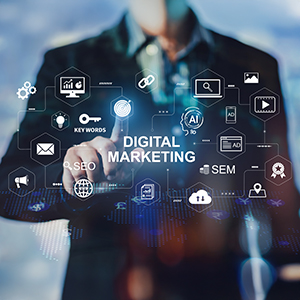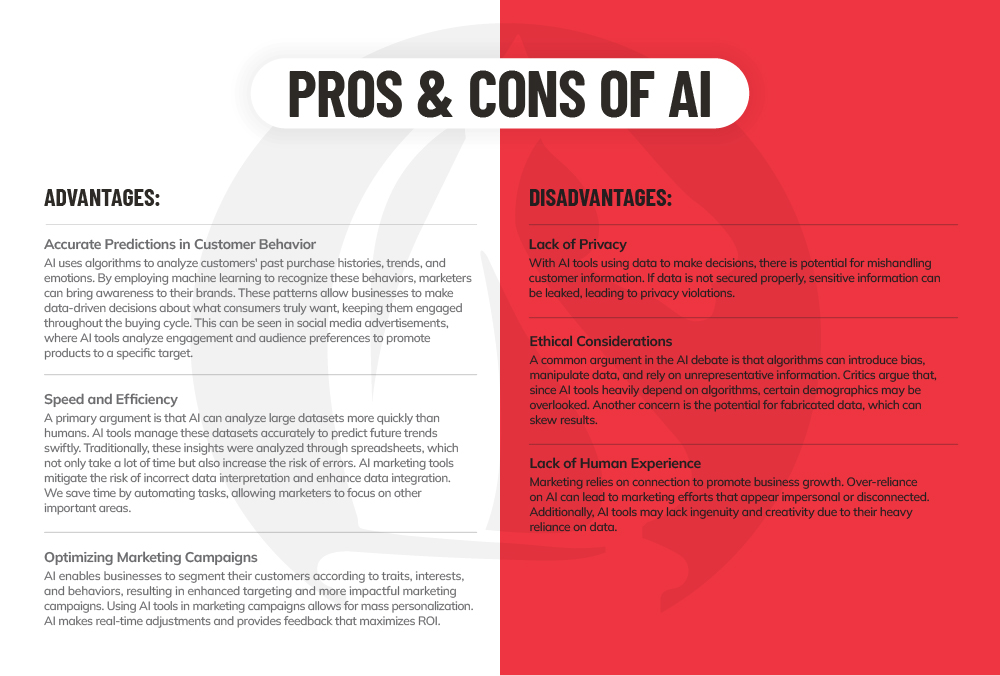From Sci-Fi to Reality: The Transformative Role of AI in Marketing
How Artificial Intelligence Fits into the Marketing Space
Artificial Intelligence (AI) used to be a far-fetched idea seen in movies, but now we see it integrated into our daily lives. AI has entered the chat to transform marketing strategies in this digital age. AI in marketing uses machine learning and natural language processing to analyze data, make decisions quickly, manage customer information, and predict marketing initiatives. Now it is trending to effectively take over tasks that marketers used to do manually in a matter of seconds. The real question is whether or not it represents an ethical advancement in the marketing industry, but that can’t be answered easily.
AI History 101
AI has always been seen as a controversial topic due to grandiose predictions about how it can affect our lives. Before AI, marketers relied on spreadsheets, focus groups, and A/B testing. Early examples of AI in the marketing industry began with data analysis and predicting consumer behavior. As De Geyter and Lippens explain, “In the 1950s and 1960s, AI began to make its presence felt in the world of marketing. Early applications focused primarily on data analysis and customer segmentation, enabling businesses to make data-driven decisions and target customers more effectively.” AI algorithms analyzed consumer data to identify patterns and preferences, allowing marketers to tailor messages and offers to specific segments.

Next, AI-powered tools, such as chatbots and predictive analytics, were implemented to streamline customer interactions and decision-making processes. Another breakthrough marketing strategy was the use of customer relationship management (CRM) systems, which are used to organize and manage customer data to create more targeted content. Common CRMs that marketers use include HubSpot, Salesforce, Anthology, Microsoft Dynamics, and more. This stems from the Apriori algorithm, or Market Basket Analysis, which was developed in 1994 by R. Agrawal and R. Srikant. As Syukur notes, “Market Basket Analysis is a data analysis technique commonly used in retail companies to identify purchasing patterns and relationships between products purchased together by customers. It helps businesses in cross-product sales efforts, improve marketing strategies, understand customer preferences, and spot purchasing trends.
From the beginning, marketers understood that the key to return on investment was data based on consumer behavior. Overall, AI not only optimizes marketing efforts but also helps businesses stay competitive in the digital age by delivering more relevant and effective marketing initiatives that surpass human capabilities.
What Does AI Look Like in Marketing?
The marketing space has been transformed due to the rise of AI automation tools and their efficiency in campaign management. Strategic marketing agencies like FabCom use AI tools daily to optimize marketing campaigns. The use of CRM software like HubSpot and Google Analytics includes AI tools within them. The State of AI report claims, “The chances that there are people out there doing marketing today and not using AI in any shape or form is somewhat unlikely.”

One common way marketers use AI is in content creation, whether it be social media posts, blogs, or editing images. In this context, AI tools used for content generation include Canva, Grammarly, Jasper, Photoshop, and many others. Data analysis allows marketers to predict the success of marketing initiatives, and AI can help speed up the process of driving business growth by analyzing customer feedback, purchases, and interactions. Some AI tools that play a role in data analytics are Power BI, Polymer, and Tableau. AI software is employed by full-service marketing agencies to enable more precise targeting and personalized customer experiences.
FabCom, a Scottsdale digital marketing agency, focuses on how a brand is perceived by different audiences and dynamically markets the unique facets of the brand that align with the preferences of each audience segment. In doing so, we attract consumers by creating highly targeted, personalized marketing campaigns that connect with audiences at the precise moment they are most receptive to convert, through the most appropriate communication channel. Ciente states, “Personalization is key in today’s marketing landscape, and AI plays a crucial role in enabling marketers to deliver tailored experiences to their audience. By analyzing customer data in real-time, AI can help create personalized recommendations.”

Incorporating personalization into marketing strategies allows customers to relate to a brand and become loyal to it. The buying cycle consists of awareness, consideration, investment, and loyalty. Using AI to create relevant brand awareness that aligns with an audience’s behaviors and psychographics is what initially attracts them. Loyalty drives engagement, encouraging customers to return and ultimately boosting revenue. To reach that point in the cycle, the personalization of a campaign is necessary. These AI tools are equipped to efficiently analyze data, manage campaigns, and personalize the customer experience, allowing consumers to connect with the brand. This is where neuromarketing comes into play: According to The Chicago School “Neuromarketing is a component of behavioral economics that studies consumer responses to marketing stimuli and the application of the resulting data to branded messaging and advertising strategies. Such data is useful for predicting consumer behaviors be.”
Having AI tools can combine key factors, such as consumer behavior and data, predicting how certain strategies will be perceived by customers and how they can affect outcomes. There is psychology behind the way a customer connects to a brand, and FabCom understands this key aspect. FabCom believes, “The neuromarketing process maps each of your target audience’s behavioral, demographic, and psychographic connection points to your brand, product, or service attributes. The sum of the mapping and attributes becomes a unique sociographic cohort profile.” By keeping consumer behavior in mind, AI can generate different outcomes of strategies based on a consumer's past purchases, emotions, or trends. Machine learning can take this information from consumer data and make informed decisions. CRM systems manage this data, helping marketers understand not only consumer behaviors but also their positions in the buying cycle. AI is helping marketers optimize their campaigns by utilizing consumer behavior data to enhance their promotional strategies.
In Our AI Era
Today, marketers are using AI at every stage of the buying cycle. AI bots can track what customers have browsed or purchased to determine what they are most likely to engage with. When you sign up for a new app and read the user guide—which you usually skip—you often consent to your preferences being sold to third-party companies. AI uses this data to target specific advertisements for the customer based on their information profiles.

Neuromarketology is cross-functional with the use of AI, as multi-segment targeting is applied. Understanding your audience's preferences and where they are in the buying cycle can help you decide how to use AI to engage them with your brand. AI employs task automation to execute a predetermined sequence of operations; an example would be when you sign up for a site and receive a welcome email. A McKinsey study states, “It is becoming increasingly easy and less costly to implement, while offering ever-accelerating complexity and speed that far exceeds human capacity. Our research suggests that a fifth of current sales-team functions could be automated.” AI is used daily to target audiences and leverages consumer behavior to connect with them without you even noticing.
Pros and Cons of AI
AI has always seemed like something that was futuristic but would never happen—like flying cars—but now it is here and causing a stir. There is no doubt about the speed and effectiveness of AI tools in gathering information and predicting outcomes, but is it ethical? Let’s take a deeper look at the benefits and drawbacks of using AI for marketing strategies.

Advantages:
- Accurate Predictions in Customer Behavior: AI uses algorithms to analyze customers' past purchase histories, trends, and emotions. By employing machine learning to recognize these behaviors, marketers can bring awareness to their brands. These patterns allow businesses to make data-driven decisions about what consumers truly want, keeping them engaged throughout the buying cycle. This can be seen in social media advertisements, where AI tools analyze engagement and audience preferences to promote products to a specific target.
- Speed and Efficiency: A primary argument is that AI can analyze large datasets more quickly than humans. AI tools manage these datasets accurately to predict future trends swiftly. Traditionally, these insights were analyzed through spreadsheets, which not only take a lot of time but also increase the risk of errors. AI marketing tools mitigate the risk of incorrect data interpretation and enhance data integration. We save time by automating tasks, allowing marketers to focus on other important areas.
- Optimizing Marketing Campaigns: AI enables businesses to segment their customers according to traits, interests, and behaviors, resulting in enhanced targeting and more impactful marketing campaigns. Using AI tools in marketing campaigns allows for mass personalization. AI makes real-time adjustments and provides feedback that maximizes ROI.
Disadvantages:
- Lack of Privacy: With AI tools using data to make decisions, there is potential for mishandling customer information. If data is not secured properly, sensitive information can be leaked, leading to privacy violations.
- Ethical Considerations: A common argument in the AI debate is that algorithms can introduce bias, manipulate data, and rely on unrepresentative information. Critics argue that, since AI tools heavily depend on algorithms, certain demographics may be overlooked. Another concern is the potential for fabricated data, which can skew results.
- Lack of Human Experience: Marketing relies on connection to promote business growth. Over-reliance on AI can lead to marketing efforts that appear impersonal or disconnected. Additionally, AI tools may lack ingenuity and creativity due to their heavy reliance on data.
With these advantages and disadvantages in mind, the use of AI in marketing strategies is unavoidable. Strategic marketing agencies are using software and AI tools to quickly and effectively optimize their campaigns. More likely than not, businesses are leveraging AI to generate content, analyze data, and make crucial decisions to increase revenue. The person behind the AI is just as important as the tool itself; without a marketing mind guiding the deployment of these tools, optimization may be lacking. It is crucial to research the tools used in your marketing strategies, but it is even more important to have someone who understands how to implement these strategies effectively. Traditional methods, such as surveys, often attract feedback primarily from those with strong positive or negative opinions. Self-reported data from surveys, for example, tend to reflect immediate reactions. In contrast, Neuromarketing tools monitor consumer responses before, during, and after exposure to survey topics, providing a more comprehensive understanding of consumer behavior.
Before AI, marketers relied on spreadsheets and manual predictions of campaign success. When marketers understand consumer behavior and employ machine learning tools, they can accomplish this faster and with fewer errors. In a day where social media heavily influences consumer behavior and trends, AI enhances marketing strategies. By balancing Neuromarketology methods with the effectiveness of AI in marketing initiatives, businesses can find a happy medium to reach their target audiences and ultimately achieve their goals.











